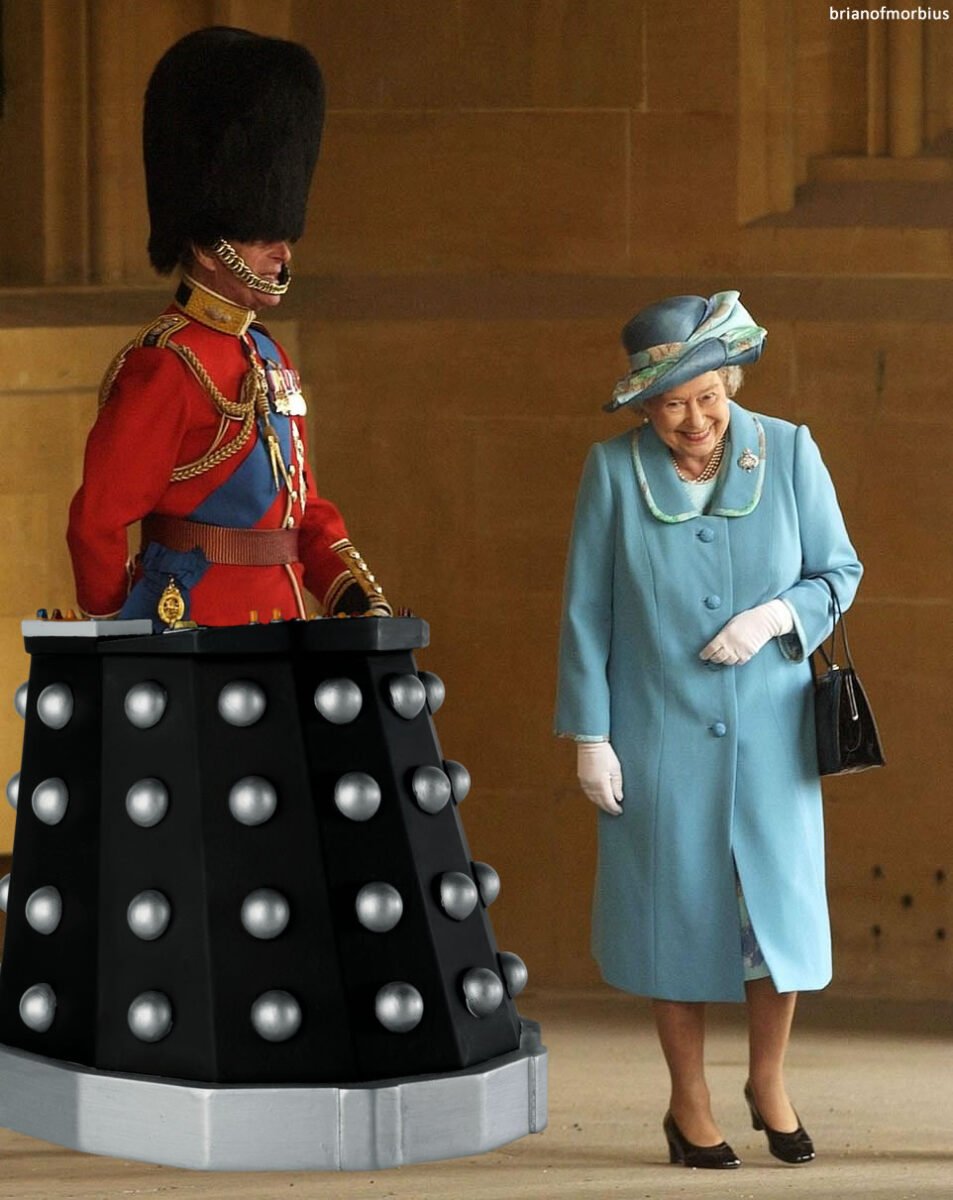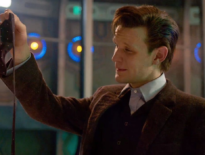I was wrenching the eight-year-old away from the computer, the swivel chair squeaking behind him, the Roblox game abandoned. Leading him by the shoulders into the lounge, where the TV sat playing looped footage. “I know you were in the middle of something, but you have to come and see this. Now.”
On screen: Huw Edwards, sombre and black-tied, reading a brief statement from a sheet of A4. We heard the national anthem. Then he read it again, the briefest of pauses an indication that someone was shouting in his ear; by the time they pinned it to the gates of Buckingham Palace, we’d more or less committed it to memory.
“Listen,” I told the children. “Years from now, when you’re my age or older or younger, people are going to ask you where you were. Remember this. Remember this moment.”
I think I was in the shower when I heard about Diana. A cramped unit on the fifth floor of an office building when the World Trade Centre collapsed. Driving to Oxford when the Baker Street sax solo vanished from the local radio station, to be replaced by a few moments of dead air and then a news broadcast reporting the death of Prince Phillip. Thursday’s announcement followed months of speculation, the unfolding of notes passed around the House of Commons and grim faces as the MPs left for the afternoon. The BBC dragged out the few clips they could find, Her Majesty walking along corridors with several presidents; greeting cheering crowds in a coat that looks like it’s been made of leftover Kermit puppets; standing at the balcony watching planes display vapour trails that look curiously like a French flag. A still image of the Range Rover carrying four senior royals was intensely scrutinised, examining eye movement and body language for any clue as to what was going on.
You watch events like this through whatever cultural lens provides the best fit. As I write this, it’s Friday lunchtime and they’ve just cancelled the football. The Beeb will not be screening any comedy until after the funeral, which presumably means next Prime Minister’s Questions will take place behind closed doors. I am waiting for the announcement that the cast of EastEnders will be filming a special scene. This is the calm before the storm, you see: that little moment where a nation is still in shock, but not yet sick of the 24-hour coverage. By the time you read these words, I suspect that memorial fatigue will be setting in with a vengeance, which presumably means it’s okay to make jokes.

Or is it? There is a sense of sanctification about the whole thing, at least in my neck of the woods (which is full of multicultural leaves adorning the limbs of Conservative tree trunks). The death of the Queen has cast a spell of sombre, almost reverential hush across proceedings, like an enchantment from some antechamber at the back of Clarence House. It is as if, for the moment at least, we should keep our opinions to ourselves. Even the republicans are toning it down, having mostly been instructed to by slightly more tolerant middlemen. If I have to look at one more black-rimmed window display, I am going to break something. It will probably be the window.
But I think about change and the nature of death and I am reminded of the mass outpouring of unexpected grief that followed the death of Bernard Cribbins. There are certain people who have already achieved a kind of assumed immortality. Mother Teresa was one. David Attenborough is another. None of us had any sort of delusions that the Queen would soldier on until cybernetic implants became not only a reality but an option in the supermarket run, but I think most of us probably thought she might make it to a century. As it stood, she lived just long enough to see off Boris Johnson, bowing out gracefully a couple of days later. This is probably a coincidence.
Where does it come from, this urge, this compulsion to write something about the whole thing? And what could we say that hasn’t been said already? I was ruminating on this with Philip. “I don’t want to do anything… crass,” he said. “We did a Queen’s greatest hits thing for her 70th jubilee”.
So did everyone else. It was almost expected, and it proved Terry Pratchett’s theory that all tapes left in a car for more than about a fortnight metamorphose into Best of Queen albums. And everyone else is doing it again, right now, because people have short memories. Everyone knows the Queen was a fan. No one here needs a rehash of The Idiot’s Lantern, or Voyage of the Damned, or that bit in Silver Nemesis.

Still, it strikes me that there are an awful lot of parallels, particularly if we’re talking about change and loss. The connections didn’t become apparent until an email I received from an old friend who pointed out that the Queen’s final days – specifically, her final political acts – mirrored the final stories of Peter Davison. There is the petulant public schoolboy, spoiled and stroppy and loathed by many, saddled with an awkward haircut and questionable taste in shorts, who leaves to pursue a glittering career somewhere far away. His replacement is a younger woman with a strange speaking voice. And then almost immediately, the Doctor dies.
It’s a crossroads, and it leads in all manner of directions. I was going to talk about Meghan Markle’s associations with 1996, and how things inevitably go tits-up the moment you involve the Americans, but decided to leave that bit out. At the same time (and in all seriousness), there is a sizeable chunk of the population that cannot remember a time when we didn’t have the Queen, just as there is a sizeable chunk who cannot remember a time when Doctor Who was not part of the culture. Many who cannot accept its inevitable demise, at least in its current format. Change is difficult for everyone. After 70 years of a female monarch, they’re suddenly switching to a man? Why? What sort of pandering to wokeness is this, anyway?
When someone is in the public eye like this – on the head of every coin, on the face of every banknote and stamp (but when was the last time you used either?), on the news at least once a week, on tea towels and bobbleheads and found staring at an autocue for 10 minutes every December 25th – they become part of the furniture. It’s all but impossible not to feel a sense of absence when they pass on. This afternoon, I was walking past the Co-op when I caught the tail end of a conversation a loud-mouthed chap in his 40s was having with the woman at the counter. “I didn’t know her,” he said brashly. “Did you? Nah. Joe Bloggs, across the road, dies. Ooh, stop the world!” And in a way, he was right – still, in my head, I could hear the voice of Jodie Whittaker, looking at birth certificates on Who Do You Think You Are?. “I never met them,” she says, more than once, “but I feel like I know them.”
And yet this is the beginning of a dangerous path. Because this artificial familiarity shares a bed with assumption, for better or worse. Put another way: we live in a world where the unholy trinity of media, government, and business tailor our consumer and citizenship experiences to make us feel divided and bereft and friendless. There are sound business reasons for doing this. A divided populace is easier to control, and people who are lonely tend to want to buy stuff. Is it any wonder that we latch on to celebrities and TV characters, when we’re made to feel we have more in common with them than with the family on the other side of the fence?

The Queen was a devoted, hardworking public servant who dedicated her life to decades of service. She also spent millions of taxpayer’s money on keeping her son out of the courts. She was the last bastion of fine British tradition. She represented a bygone age that is thankfully behind us. Choose one of the above. Actually, choose all of them. Because above all else, the Queen was a human being. We forget that. Like all those who spend their lives in the public eye, she is adulated or despised, cast in the role of celestial hero or reprehensible villain. It never seems to occur to people that she might be a little of both.
We have the same problem with the Doctor – both with the Doctor and the people who talk about him. We have a character living by the well-intentioned but ultimately unassailable mantra that is “Never cruel, never cowardly”: the Doctor has been both, and is not a hero of any sort, in any incarnation, and anyone who tells you otherwise probably isn’t paying attention. And yet all too often we’ll reduce a complex character to an archetype in order to score political points. We’ll use it as an excuse to bash writers, and actors, and their custodians and also their critics, when the real issue is what we ourselves might actually be feeling at that moment. We heed the voice that wants to have the argument, and the argument is protracted and brutal: never has there been such a maelstrom of intolerance and hatred, and never have the words “Be kind” been thrown about with such ironic abandon. It works on both sides. The people who call out negative behaviour are labelled misogynistic man-babies or libtard snowflakes, depending on whose turn it is to do the shouting. Sometimes the label is justified; justified is not usually the same as helpful. There is no place for discourse, because the spectacle of confrontation is more enticing, and that’s what keeps the fandom ticking along in its twilight death throes of fading relevance.
Take the Doctor out of the equation and you can have the same argument about Brexit and Beergate and Trump and Kyiv and vaccines and ice caps and it will go the same way every time. And there is the Queen, sat in the middle, stoic and largely unreadable, keeping her views largely to herself. It was the price she paid for the privilege she enjoyed: the need to keep silent and leave the rest to the body language experts. I would never want to deny anyone their need to make themselves heard, but perhaps we could learn from that. We must call out intolerance and bigotry and hatred and injustice, whether it’s in the streets or on the streaming services, but we can – we must – do it better than we have been. We must be better with others and more honest with ourselves. And perhaps if there’s anything I’ve learned these past few days it’s that I need to be more spongelike. Perhaps still waters really do run deep, and we would understand each other better by talking less and listening more.
I can’t help thinking that’s what the Queen would have wanted.



